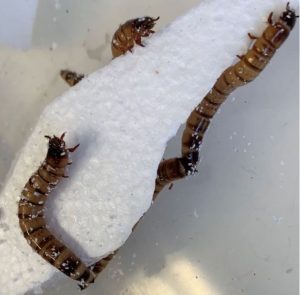
Researchers discover that ‘superworms’ will eat plastic waste
Canadian Plastics
Recycling Research & Development SustainabilityA species of worm with an appetite for polystyrene could be the key to plastic recycling on a mass scale.

Photo Credit: University of Queensland
If the sum total of your exposure to worms is having baited one or two on a fishing hook, you might be surprised to learn that a species of worm with an appetite for polystyrene (PS) – a particularly troublesome plastic from a recycling point of view, because it can often take 500 years to break down and decompose in landfills – could be the key to plastic recycling on a mass scale.
Researchers at the University of Queensland (UQ) in Brisbane have discovered the common Zophobas morio – a plump larva the length of a paper clip commonly called a “superworm” – can eat through PS, thanks to a bacterial enzyme in their gut.
Dr Chris Rinke and his team from UQ’s School of Chemistry and Molecular Biosciences fed superworms different diets over a three-week period, with some given PS foam, some bran, and others put on a fasting diet.
“We found the superworms fed a diet of just PS not only survived, but even had marginal weight gains,” Rinke said. “This suggests the worms can derive energy from the PS, most likely with the help of their gut microbes.”
The researchers used a technique called metagenomics to find several encoded enzymes with the ability to degrade PS and styrene. The long-term goal of their research is to engineer enzymes to degrade plastic waste in recycling plants through mechanical shredding, followed by enzymatic biodegradation. And it’s hoped that this bio-upcycling will incentivise plastic waste recycling and reduce landfill.
“Superworms are like mini recycling plants, shredding the PS with their mouths and then feeding it to the bacteria in their gut,” Rinke said. “The breakdown products from this reaction can then be used by other microbes to create high-value compounds such as bioplastics.”
According to research team member and PhD candidate Jiarui Sun, the team aims to grow the gut bacteria in the lab and further test its ability to degrade PS. “We can then look into how we can upscale this process to a level required for an entire recycling plant,” Sun said.
